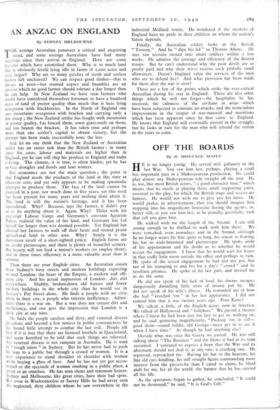OFF THE BOARDS
By B. MONTAGU SCOTT
HE is no longer young. He served with gallantry in the last War. You saw him last, perhaps, playing a small but important part in a Shakespearean production. He could play almost any Shakespearean role straight off the mat. He is, too, like most British actors, " a good character man," which means that he excels at playing those small supporting parts, essential to the play, for which the British stage and screen are famous. He would not wish me to give you his name. He would prefer, in advertisement, that you should imagine him stepping into his magnificent limousine fleeing the agents, or, better still, as you saw him last, as he grandly, gratefully, took that call you gave him.
He walked with me the length of the Strand. I ItIn still young enough to be thrilled to walk with him there. We were remarked, even nowadays, and in the Strand, although he no longer wears his hair quite so long, his cravat so flowing, his hat so wide-brimmed and picturesque. He spoke airily of his appointment and his doubt as to whether he would accept the engagement. I knew that he would wait for hours in that stuffy little room outside the office and perhaps in vain. He spoke of the screen engagement he had just not got, but not of his tramping to and fro for a day's " crowd " and its resultant pittance. He spoke of his last part, and invited me to do the same.
He did not speak of his lack of food, his always meagre, dangerously dwindling little store of money put by. He did not speak of his wife's illness. He reminded me of how she had " knocked 'em " in her last appearance. I did not remind him that it was twenty years ago. Poor Katie!
We talked, a little, of the English actors now in America. We talked of Hollywood and " ballyhoo." We passed a theatre where I knew he had been just too late to get in, walking on, and he said, gesturing magnificently, " Packing 'em in still— good show—sound laddie, old George—must get in to see it when I have time." As though he had anything else!
Outside what was once the Gaiety we parted. He was still talking about " The Business " and the blows it had in its time sustained. I ventured to express a hope that the War and its aftermath should not deal it, at any rate, a crushing one. He reproved, reproached me. Raising his hat to the heavens, his fine old eyes kindling, his still straight figure commanding more interest from the passers-by than I cared to claim, he lifted aloft for me, for all the world, the banner that he has carried all his life.
As the spectators began to gather, he concluded, " It could not be destroyed," he said, " It is God's Gift."


























 Previous page
Previous page